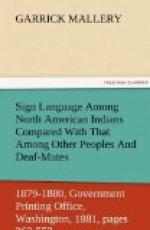In fact, individuals of those American tribes specially instanced in these reports as unable to converse without gesture, often, in their domestic abandon, wrap themselves up in robes or blankets with only breathing holes before the nose, so that no part of the body is seen, and chatter away for hours, telling long stories. If in daylight they thus voluntarily deprive themselves of the possibility of making signs, it is clear that their preference for talks around the fire at night is explicable by very natural reasons wholly distinct from the one attributed. The inference, once carelessly made from the free use of gesture by some of the Shoshonian stock, that their tongue was too meager for use without signs, is refuted by the now ascertained fact that their vocabulary is remarkably copious and their parts of speech better differentiated than those of many people on whom no such stigma has been affixed. The proof of this was seen in the writer’s experience, when Ouray, the head chief of the Utes, was at Washington, in the early part of 1880, and after an interview with the Secretary of the Interior made report of it to the rest of the delegation who had not been present. He spoke without pause in his own language for nearly an hour, in a monotone and without a single gesture. The reason for this depressed manner was undoubtedly because he was very sad at the result, involving loss of land and change of home; but the fact remains that full information was communicated on a complicated subject without the aid of a manual sign, and also without even such change of inflection of voice as is common among Europeans. All theories based upon the supposed poverty of American languages must be abandoned.




